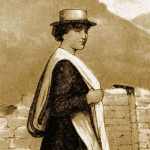I
Far-sighted into yesterday
they stand, gripping
their charters and speeches,
the presidents and kings,
masters of unconscious evil.
Their deputies are here —
judges, robed executioners,
steely and triumphant.
And stunned at their feet,
the beheaded, the betrayed,
healed and hallowed now
in this grave sorrow of wax.
II
We enter, adjust to the gloom,
to the lighting that plays
on the painted, staring faces.
We think to ourselves, murmur
to the one standing beside us:
"How compellingly strange
these people are, and yet familiar
to the world we left behind us,
the street and the household..."
These are the people whose names
we learned, whose lives we studied,
whose thoughts we have become.
Each lighted stage with its play
of the lost and the violent —
comedians and stuntmen,
heroes transfixed in purpose.
We pause, to read once more,
in deliberate, bald summation,
what art, wax, and history
have made of the dead:
something more than a mirror,
less than a telling likeness;
an ideality slick with blood.
III
How easily in the live heat
of truth and summer
these actors wilt and perish.
Henry of Church and England
is here, savage and senile,
still laced in his armor;
his lopped and stunted wives
stand grouped around him.
Bismark in his iron corset,
endlessly dividing Europe;
Wilhelm, that struttng dwarf,
abject in abdication.
And here, the fatal mischief
of Sarajevo — how swift a fire,
how long a burning, came
of the Archduke's festive ride,
his shot and bloodied tunic.
And no more telling prophecy
in the wake of armistice
than that one dated cartoon
with its hooded sentry
and its graveyard owl:
"It has been six years..."
How easily a puff of smoke,
a square of burnt cloth,
a shocked cry, can change
the world, and leave it
neither worse nor better.
IV
Here is a man, thief or martyr,
hanged at Damascus Gate
with a hook through his gut.
He swung, seared by the sun
and kissed by the night.
And maybe one of the market
women brought him water,
and maybe not — once seen
by the Sultan's watch,
she might have lost her hands.
As in the time of Richelieu,
certain men the crown accused
were exposed in iron baskets
like plucked birds.
They fouled their nests,
starved and blackened until
they died; and the city lived
with their cries, their rank
mortality, night and day.
The hook is black and crescent,
the body swings, inert,
as if asleep and dreaming.
The guidebook tells us the man
survived his hook and lived;
it doesn't say how long.
V
Here, with his tins and furs,
is Minuit, buying Manhattan.
We see the Dutchman's flourish,
the Indians' foolish feathers.
He takes their land, and they
his bitter gifts, his brass
and trinkets — so little cash
in place of an earthy kingdom.
Wolfe, Montcalm, on the plain
below Quebec: the one dying,
the other condemned to follow.
We pass, reading from face to face,
from book to book, uneasy
that among these celebrations
so many rigged transactions
have gone unquestioned.
And all our wigged colonials,
our Franklins, conspiring
with their strongbox keys
and profitable lightning —
that so much ink and dust
and shuffled paper conceals
their tidy pilferings,
their purity and blunted wrath.
Were there rooms in this house,
each with its tabled motions
and false partitions
might furnish a history,
one slow truth at a time.
But never in our late arrival
have we stilled confusion,
to learn how great a folly
follows in the wake of fathers.
From their deliberate violence
we come to our own lamed
misrule, its slick banality
and crime without passion.
To Ike, to Kennedy and Ford,
golfers and temporizers;
to perennial candidate Nixon,
whose cheek was never turned.
Out of his sleek arrest
he steps towards us,
as if to greet a voter —
a fixed, ferocious smile
on the blue jowls
brushed with powder.
VI
Nothing we have painted
and framed in our passage —
neither prayer nor courtship,
nor solace of sleep
and self — escaped the grip
of these iron centuries.
Here, in a row of lighted
cases, a few artifacts
are on display. No comfort
to us now in that familiar,
edged interrogation...
But the biting persuasion
of chains and collars,
of inching racks, fire tongs
and screws — in the eyes
of kings and churchmen
the instruments of truth.
And whosoever might trespass,
on whatever lawful ground,
would find for his solace
a more forbidding marriage.
As once in a stone embrasure
I saw a belt for virgins,
a hinged and rusted clasp,
with a lock, and a slit
for functions — all but one.
Imagine with what shocked
dismay a man might grope
for his sweetness there,
and all too soon awaken,
clamped in his ecstasy.
VII
Another room,
with smaller people
and thinner walls.
Here the Queen plays
with cryptic cards,
hands out assignments:
"You are the Hunchback,"
she says, "and You
the Hangman, and You
the Jack of Trades."
She pares and quarters
her venomous apple,
calls for her mirror,
and her image smiles
to watch her glass
fill up with poison.
beauty is sleeping,
the Prince is awake,
and far in the forest
a frostlight winks
from the Sugar House.
The Witch is singing
and lighting her oven.
The Woodcutter's
wayward children watch,
they break and nibble
the sweetened glass.
The images whisper
and darken, conspiring
in their tumbled tale
of fretful spinners,
of drones and dumble-
dores, wise eggs
that speak and shatter.
And it looks as if
the painted sleepers
in this dreamworks
are about to awaken:
the crafty Queen
and her players,
the musical mice,
the drones
and the spinners —
All in a scampering
rush, to find
the nearest exit...
As the looking glass
draws us deeper
into the bright play
of shadows that melt
and run and freeze...
The mad, mad romp
of children, of rabbits
and dwarfs, who keep
their strange hilarity
in so much horror.
VIII
Call those from underneath,
the sold and trodden,
their slow and sweating sons,
elevate and crown them.
Patch up their clothing
and wash their skins,
rub their faces
until they glow,
and their dull eyes brighten.
Give them speeches to learn,
and eloquent gestures,
power to grasp,
laws to break and mend.
Great heat and furious labor
bring on in them
this drear and mystical change:
At first a swinish fattening,
and then a leaner look,
and in their eyes
the same feral glitter
of their late unkindly masters.
They sicken as they flourish,
until like wickless candles
they slump and totter;
their heads are rotten,
their famous flesh
has run to sticky pools.
They die and sleep afoot,
their ignorant hearts
grown wise in the ways of wax.
IX
In all these wax memorials
only appearance changes.
Crowned heads and axes fall,
thugs and jailors rise
and displace each other
in this long, uneasy walk
we have littered
with claims and captions.
The heroes are always welcomed,
are propped and shaven,
their ruddy male composure
is sleeker than ever,
though the great sleeves
and brutal collars
give way to softer buttons.
The paper in official hands
rustles as before,
though it is only paper,
paper in cheap supply,
and not the bleached fell
of a difficult sheep.
And yet the neat persuasions
are seen to tighten,
and each new litigation
is a running noose...
All that increases,
all that gluts and fattens,
matures its option here:
Honor to thieves and merchants,
long life to the butcher.
And for the just petitioner —
sweeper of the hallways, scapegoat
and discard — no reply
but the rote of legal fictions;
to which he listens, now
as in the days of Pontinus,
stricken with understanding.
X
The rooms are large and numerous,
and we in our restless striding
find that they never end.
It is as if we had lived here
always, captive to this endless
and malign instruction;
had served those mighty tempers,
and learned too well
these never-blotted names.
And we live here still,
sharing these murderous spaces,
this blood-haunted silence.
And once we started from sleep,
terrorized and whimpering,
to see in the luminous,
sunken light, the head
of a long-forgotten agent:
a face like a father,
one who might have comforted,
but cannot see or hear us:
bald, vacant, and amused.
XI
All is as it must or might be,
here at the story's end —
the jury dismissed, the witness
excused, and all are guilty.
To have come so far, walked
so easily through so much anguish,
pride, and stupor of evil,
and yet we are standing still,
locked in an echoing foyer.
In so driven, so brief an itinerary,
a day will stand for a decade,
an inch for a mile — so far
has a painted fiction served us.
These bones in their period costumes
would bend if we touched them;
their flesh would yield,
and all arrangements topple.
But see how they bring toward us
the old, sustaining gestures —
a stride, an arm outstretched —
the furrows in the smiles
deepen, and the red lips smear.
Great captains command, obedient
ranks go down. In all these propped
assemblies I know a substance
neither wax nor wholly flesh —
a tried and mortal nature,
familiar as the warmth in my hand.
XII
Were we not lost, condemned
to repeat these names
and to honor their crimes,
a voice among us might cry out,
speak to those who are
stopped here:
Whose faces are these
that melt and run?
Children and guardians, giants
and dwarfs —
Oh, people, people...
Who are these heroes
and where are their victims?
We who are standing here
with our guidebooks suddenly closed
and all the exits darkened...
Until another gallery opens,
or the sun through that skylight
strikes us all —
souls in torment,
pilgrims and doting fathers...


















Comment form: